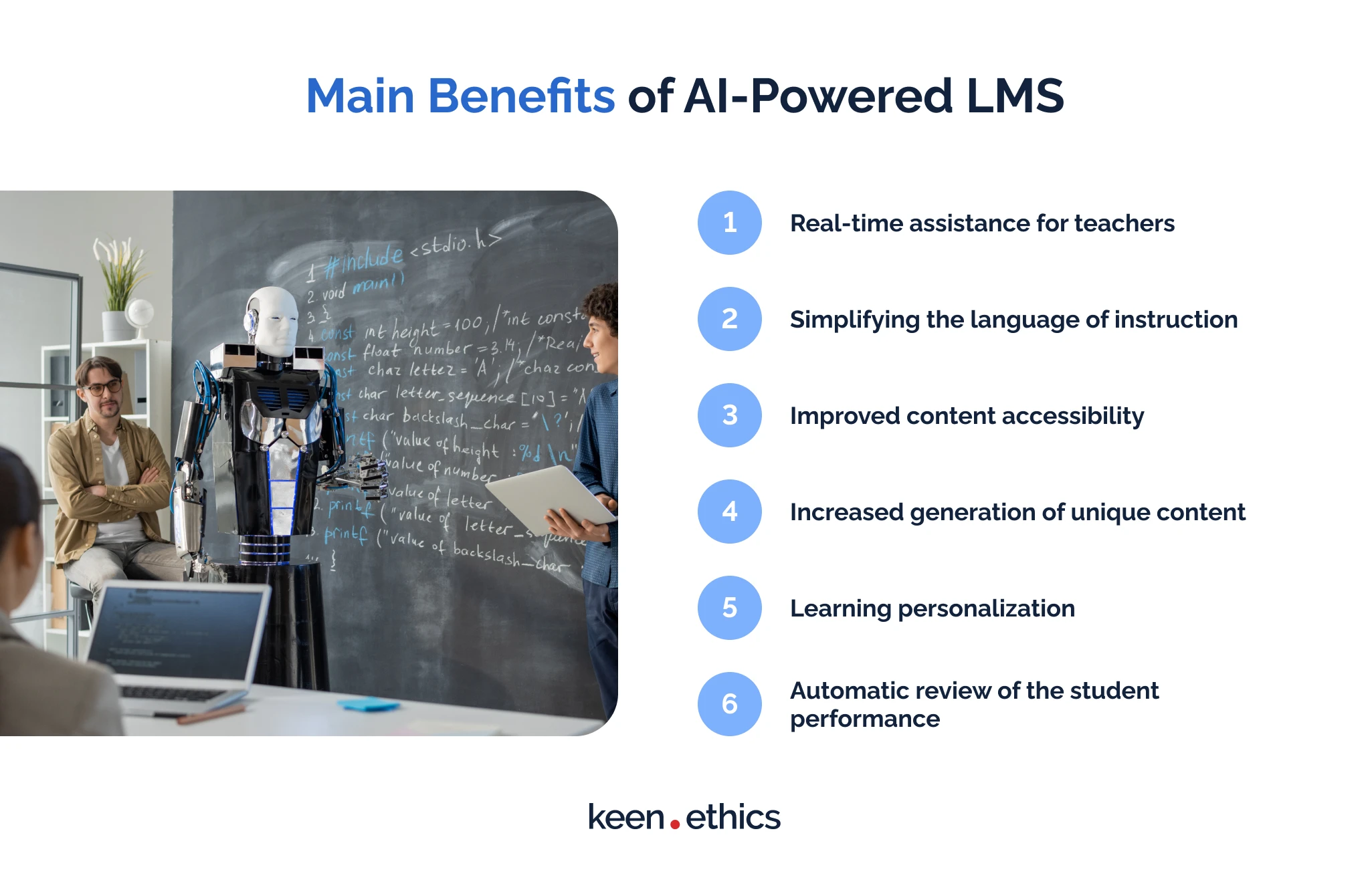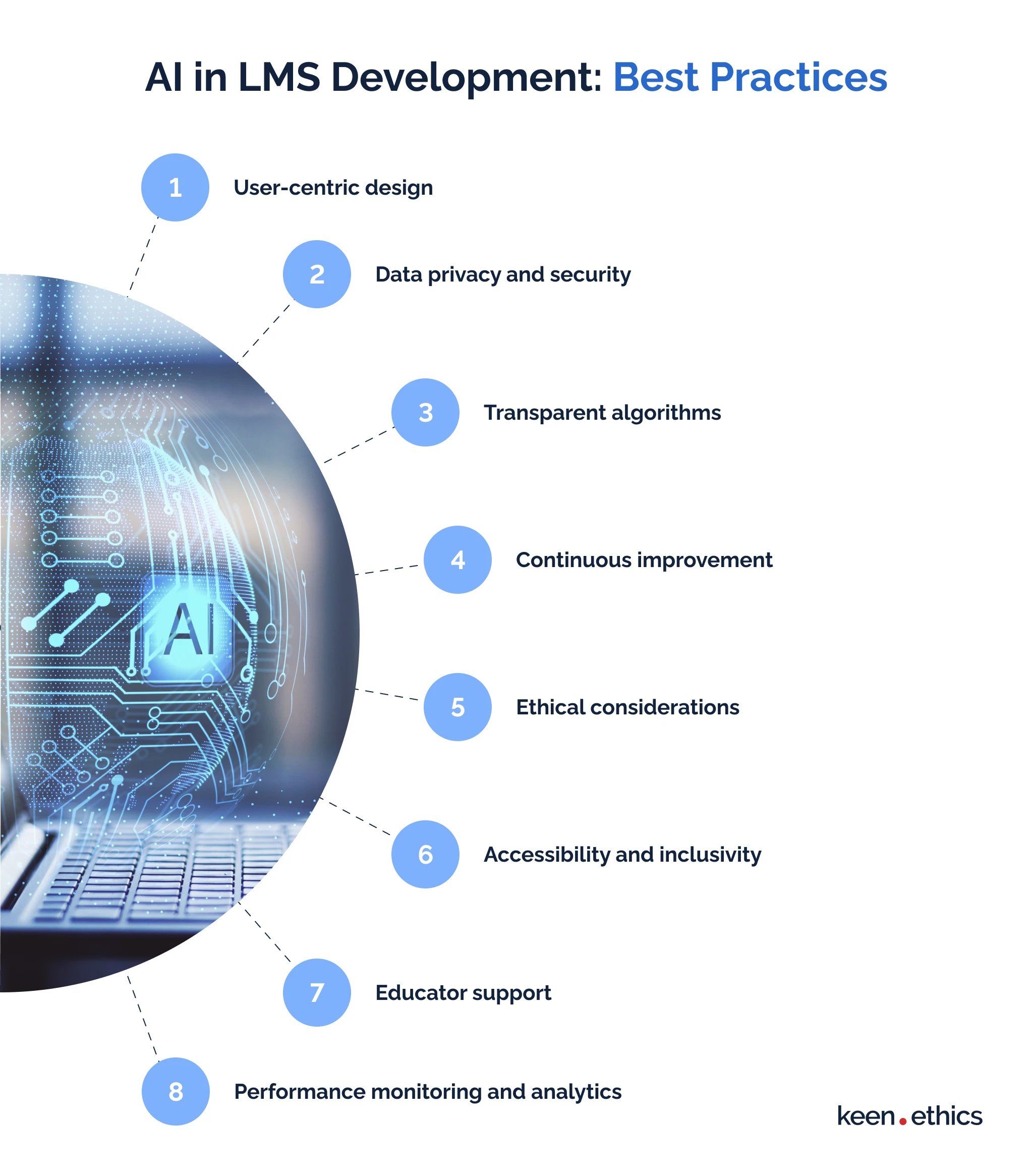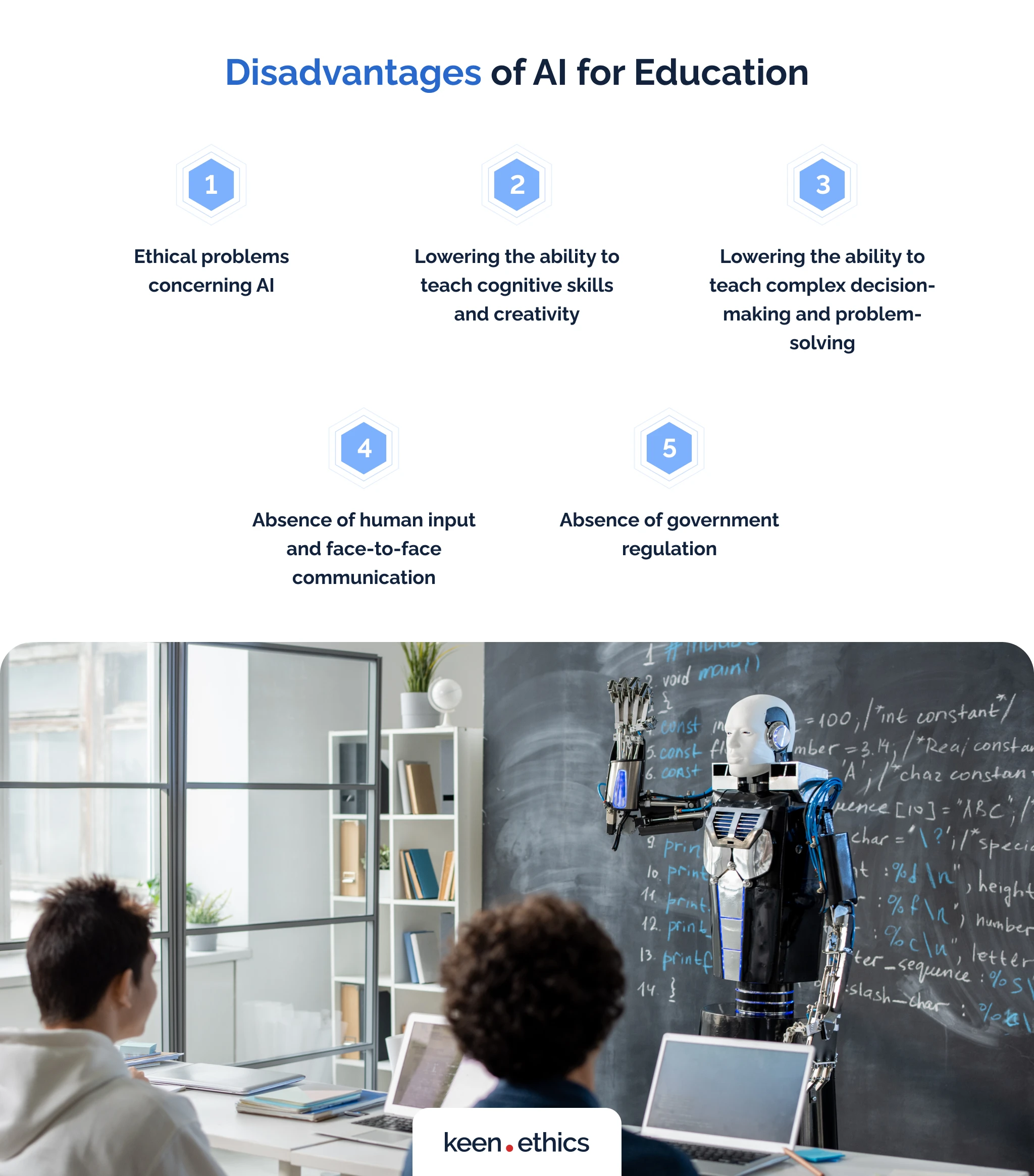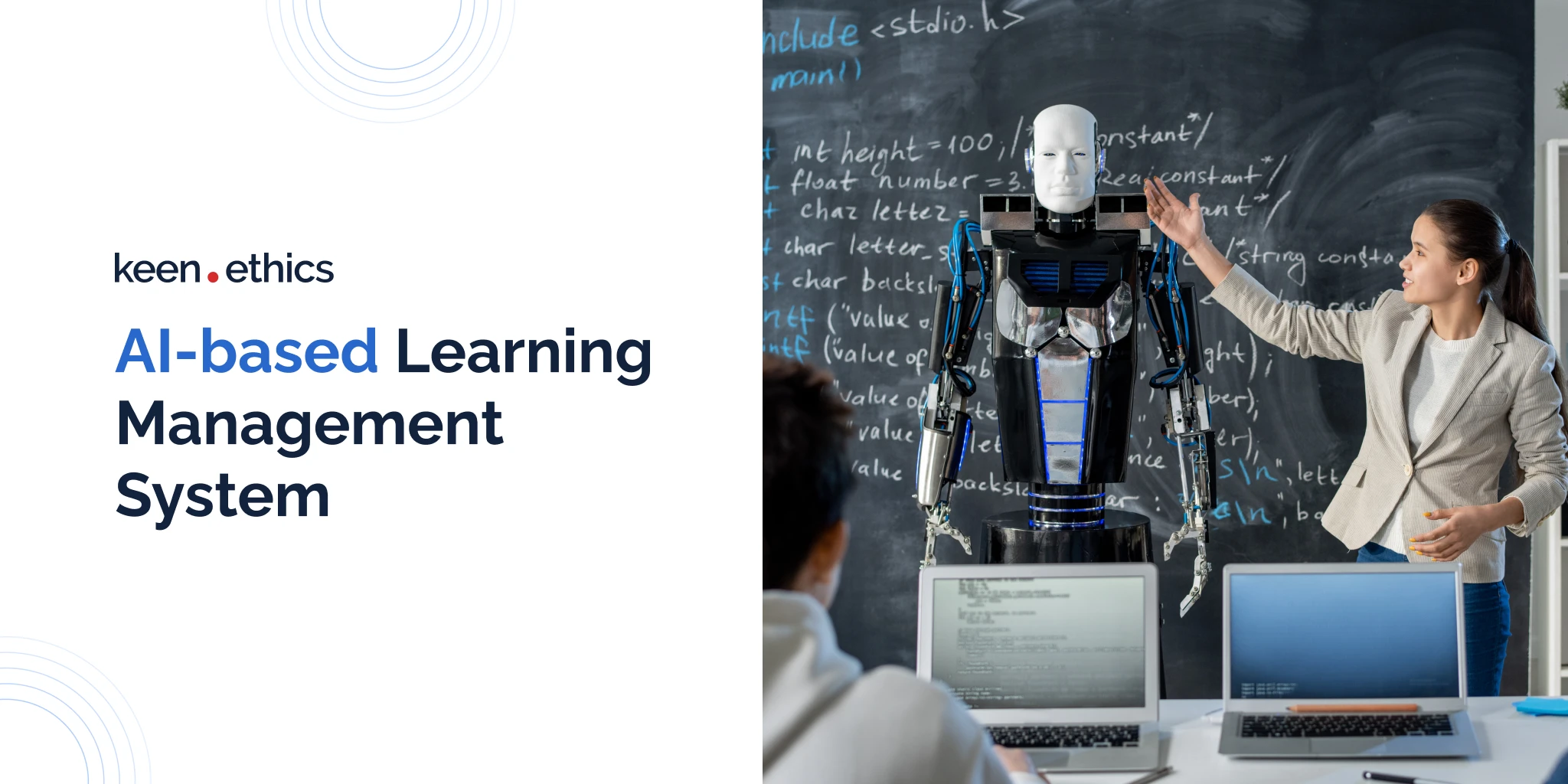AI-powered LMSs are the future of education. You can learn about the critical aspects of this technology in this article.
Learning management systems are a potent way to enhance the education process. The rise of artificial intelligence is a perfect opportunity to update many practices in modern education. LMS technologies are likely to become one of the first elements that will change with the appearance of the innovation in question. An AI LMS makes learning easier for students and removes many tedious tasks for the average teacher. In this article, we review the essence of AI-based LMS and then outline some of the key benefits of such innovation for the users. As you’ll see, LMS with AI is among the most promising innovations for the modern online learning field.
What is an AI-Based LMS?
Before we discuss the benefits of the technology or its differences/similarities in comparison to traditional LMSs, it’s essential to define what AI-powered LMS platforms stand for. So, what’s an AI-based LMS? An AI-based LMS, or Artificial Intelligence-based Learning Management System, is a software platform that helps people learn and manage their educational materials with the assistance of artificial intelligence technology. In short, this term stands for the integration of AI in LMS. How do such technologies work? An average AI-centric LMS uses smart algorithms and machine learning to provide personalized learning experiences, such as adaptive content recommendations, automated assessments, and intelligent feedback. The AI analyzes user behavior, preferences, and performance to optimize learning. It’s also a great way to automate administrative tasks. Why is this important? Such an approach makes learning more efficient and tailored to individual needs. In this regard, we can compare an AI to a personal teaching assistant. Instead of employing a real person for this goal, however, you can use AI to make all the key recommendations for the relevant students. LMS with AI is a perfect opportunity to improve the learning process for everyone at a low price.
Usual LMS vs. AI LMS
Now that we understand the essence of an AI-powered Learning Management System, it’s also crucial to look at its difference compared to traditional LMSs. A traditional LMS is a piece of software helping users to manage courses and the learning process through computer-centric tools. An AI-based LMS incorporates these functions completely and then adds artificial intelligence to boost customization. While traditional LMSs have limited tools for adapting to the capabilities of the learners (they’re bound to strict algorithms, which can be inflexible for some students), AI-based ones solve this problem by providing flexible analysis. AI tools offer human-like reactions to the behavior of learners. This means the quality of the learning frameworks they provide is much higher than in the case of traditional LMSs. For example, they can generate training material based on the learning style of the involved individuals. All in all, AI-based Learning Management Systems are the evolution of traditional frameworks. They combine past innovations with bleeding-edge technologies that improve learning efficiency ten-fold.
Main Benefits of AI-Powered LMS

Do you still doubt if creating an AI-based Learning Management System is a rational choice for your company? In that case, let’s review the key benefits of this technology for modern education facilities:
1. Real-time assistance for teachers
Many negative tendencies in the learning process start with minor problems. In fact, challenges with understanding even one concept quickly derail the ability of a student to learn some material later on. For instance, the knowledge of tenses in English is essential for many other topics (such as Conditionals). If you miss this information, studying further training content is difficult and often impossible. Real-time assistance for teachers via AI tools solves the presented problem of skill gaps. An AI tool immediately notes if a person has issues understanding some concepts. Using this information, the teachers can decide what aspects of learning to target and what individual needs the students have. With the appearance of such tools, we finally possess a reliable instrument for preventing students from falling behind in their educational journey.
2. Simplifying the language of instruction
Many teachers enter the education field after studying or starting a career in some other sector. A common pathway is to specialize in a ‘practical’ field such as English language or programming and then transition towards a Master’s degree in education. This approach sometimes creates a major problem for the relevant specialists: they’re competent in their field but don’t know how to explain concepts in simple language. AI offers an opportunity to solve this problem once and for all. Modern language models can explain many concepts in a straightforward learner-oriented way by creating their own educational content. This means it’s possible to create custom tasks and even texts explaining theoretical information that consider the learners’ skills.
3. Improved content accessibility
AI LMS improves content accessibility by employing various features. It can utilize speech recognition technology to convert text into spoken words. This is important for making various learning opportunities accessible to visually impaired individuals. Furthermore, AI can generate alternative formats, such as braille or large print. This means that the technology in question can cater to the needs of learners with specific disabilities. Besides, AI-based LMS can also use language translation capabilities to provide content in multiple languages. In this way, the learners who aren’t fluent in the original language may access material from other countries. Why is this important? An AI-powered LMS greatly increases the accessibility of education in developing countries. AI is notable for its ability to work with even the most obscure languages (as long as there are enough texts to build a neural network) because it goes beyond statistical analysis to translate. In this way, many impoverished minority communities across the globe will get an opportunity to access courses from the top educational facilities. For example, experts in machine translation note that it improves foreign language learning by giving the learners a tool that can, for example, double-check their understanding of particular passages in texts or grammar in writing.
4. Increased generation of unique content
Education requires a lot of content: one has to offer new texts and practical tasks for the learners during every lesson. All these aspects create tremendous pressure for many teachers. It isn’t enough to use the solutions provided on the market. A good teacher creates their content because they have to target the unique needs of the learners. AI tools can help with this goal. These instruments offer unique tasks for the learners, saving a lot of time for the teachers. Increased content generation makes the learning process much more flexible.
5. Learning personalization
A big aspect of AI-centric LMSs is the ability to personalize the learning process. It’s possible to create solutions that target the unique needs of the learners. How exactly does this work? For instance, an AI-based LMS can decide the complexity of the tasks via the learner’s performance. If a person progresses with some tasks fast, the tool will offer them harder problems. One can also register the interests of the users via such a framework. An AI can offer some further learning recommendations, helping with the choice of profession. Non-AI systems also do this (especially with human input). Nonetheless, AIs are much more efficient at delivering high-quality recommendations.
6. Automatic review of the student performance
The analysis of student performance is a significant time sink. For example, one sometimes has to spend hours checking the relevant tests. Dave Speck, an expert at education-centric TES magazine, notes that teachers spend up to 44 days a year assessing the students. AI solves this problem once and for all. It can check tests and even more complex tasks without major human input. This means that a teacher gets an opportunity to spend more time preparing some high-quality teaching materials. The ability of AI to check the student information independently is also crucial from the standpoint of preventing bias. An automatic system has no preferences: it’s impartial regarding all aspects of human personality.
Related Services
EDUCATION SOFTWARE DEVELOPMENT SERVICES FROM KEENETHICS
Real Use Cases of AI In LMS
There are many examples of AI-powered LMS in modern markets. Here are some of the key cases one needs to consider if they want to succeed:
1. Duolingo
Duolingo, a popular language learning platform, uses AI to personalize language courses. One can learn more than a dozen languages on the platform, making it a perfect entry point for all people who want to understand the basics of certain languages. The highlight of the app is its ability to adapt to the learning progress, offering high-quality feedback to learners. How does the app do it? Duolingo analyzes user performance, adjusts difficulty levels, and provides customized output to enhance learning outcomes via AI algorithms. These AI algorithms track user achievements and identify areas that need improvement through quizzes. Such a gamification approach allows Duolingo to deliver targeted exercises for efficient learning. The developers of Duolingo are also pursuing further innovations in AI using the predictive analytic method. Recent information from the app developers shows that they have integrated GPT-4 into its premium service to maximize learning outcomes and valuable insights through a chatbot.
2. Coursera
Coursera employs AI to enhance the learning experience. Its AI-centric recommendation system suggests relevant courses based on user preferences, past performance, and career goals. This personalized approach helps learners discover courses aligned with their interests and aspirations, increasing engagement and satisfaction. During the COVID-19 pandemic, the service used this feature to help the learners find online courses corresponding to the content they were learning at universities. In this way, the users could improve their knowledge of certain subjects even despite the deterioration in the quality of teaching that befell the world during lockdowns.
3. Cerego
Cerego uses AI to optimize content delivery and retention. Its adaptive learning platform employs algorithms that analyze user responses and adjust learning pathways accordingly. It identifies knowledge gaps, repeats challenging concepts, and reinforces learning at optimal times to maximize long-term retention. AI also allows Cerego to deliver features such as automatic video transcribing. The Smart Create function of Cerego also enables one to construct a course template automatically. The AI this company uses analyzes the web to produce content recommendations and even tasks for a particular course.
4. Knewton
Knewton applies AI to create adaptive learning experiences. Its platform analyzes student data, including performance and behavior, to provide personalized content recommendations. It dynamically adjusts the difficulty level of questions and delivers real-time feedback. In this way, the students can learn at the pace they need (rather than the one set by some government or corporate bureaucrats). Such an approach allows tailoring the learning journey to individual needs and promoting mastery.
5. ALEKS
ALEKS, an AI-powered math learning system, assesses students’ mathematical knowledge and tailors personalized learning paths. It identifies strengths and weaknesses, provides targeted practice, and guides learners through individualized lessons to improve their mathematical proficiency. In this regard, it’s similar to Knewton: the platform seeks to solve the issue of repetitive tasks in student and employee training programs.
These companies demonstrate how AI in LMS can enhance personalization, recommendation systems, adaptive learning, and knowledge assessment to create more effective and engaging learning experiences. As you may see, AI is already a viable technology for enhancing learning.
AI in LMS Development: Best Practices

What are some of the best practices regarding AI-powered LMSs? Here’s the list of the key factors you need to consider:
User-centric design
The first thing you need to do is prioritize the needs and preferences of the learners when developing the AI-powered features of the learning management system (LMS). Ensuring an intuitive and personalized learning experience is key to long-term user loyalty. Learning is a process that takes a lot of time in both traditional assessment and non-traditional frameworks. You must ensure that the time users spend on your platform is as comfortable as possible.
Data privacy and security
Education systems tend to have rather limited information on the learners. Nonetheless, some sensitive information enters these systems, too, creating a source of potential danger for the users. What should you do to solve this problem? We believe it’s a good idea to implement robust measures to protect user data, including encryption, access controls, and compliance with data protection regulations. Only this approach can help you build trust and maintain confidentiality in the AI-driven LMS.
Transparent algorithms
There’s a major challenge for many AI systems: they can potentially reflect the biases of their creators. Bugs and illogical decisions may also stem from the analysis of human discourse, which is usually crucial for such systems. To solve this problem, we believe you should ensure transparency in AI algorithms used in the LMS by providing clear explanations of how the system makes recommendations or assessments. A system that assesses the learners on the basis of obscure principles can quickly turn into a source of major stress for them. For many people, this is a major ‘red flag’ that can destroy the reputation of an app.
Continuous improvement
No matter how much you invest into refining the first release of your e-learning platform, it’ll encounter some negative user feedback once it hits the market. This outcome is natural. Sometimes, product developers can’t predict who’ll truly approve their software. In this light, you should regularly update and refine the AI algorithms and models based on user feedback, learning outcomes, and emerging technologies. This approach will help you adapt to the inevitable mismatch between market analysis and market reality.
Ethical considerations
As we’ve already mentioned, AIs can reflect the biases of their creators. This can happen either by design or due to the analysis of human texts. What’s the key thing to do at this stage? We believe you should embed ethical guidelines into the development process to prevent biases, discrimination, and unethical practices in the AI algorithms. Will this help remove all bias-related problems? No, but active interventions can minimize their likelihood.
Accessibility and inclusivity
Out of 331 million people in the U.S., 54 million have some disabilities. Creating accessible design, in this case, is a reasonable step from the business standpoint. After all, a lack of accessibility can lead to you losing 16% of the market share. In this regard, the best practice to consider is simple: design the AI features of the LMS to be accessible to learners with disabilities, ensuring compatibility with assistive technologies and adherence to accessibility standards.
Educator support
AI systems are quite user-friendly these days, but they nonetheless require at least some expertise to function well. For example, there’s now a major market around ChatGPT prompt creation, with many paid courses appearing on the market. Udemy already features paid courses for so-called prompt engineering. While younger teachers may be capable of understanding AI systems without major outside assistance, the older ones may have problems with them. This means that leaving those people without assistance is irresponsible. What’s your key goal here? We believe you should provide adequate training and resources to educators on effectively utilizing the AI-powered features of the LMS. Only this approach can enable them to leverage the technology to enhance teaching strategies and support learner engagement and success, instead of using the platform to create boring and repetitive tasks.
Performance monitoring and analytics
A major advantage of all computer-based systems is that they allow the processing of a tremendous amount of information. All AI-powered LMSs should capitalize on those factors and give students and teachers as many insights into their learning habits and behaviors as possible. We believe that the best practice is to incorporate robust analytics capabilities into the AI-driven LMS to track learner progress, identify areas of improvement, and provide data-driven insights.
Disadvantages of AI for Education

AI has some major disadvantages. While we believe that an AI-based LMS will likely revolutionize the quality of education in your facility, it’s also crucial to note that sometimes this technology damages the education process. While adopting such innovations in your business, you must always consider the potential long-term problems. We believe one can solve them; nonetheless, adapting as early as possible is crucial. Here’s the list of the key issues you need to consider:
Ethical problems concerning AI
The integration of AI in education involves several potential problems. Let’s review the key issues one needs to consider. Above all, AI integration raises major concerns regarding data privacy and security. AIs extensively collect user data; a leak from such a system can be devastating for many individuals. Another ethical issue is the potential for bias and discrimination in AI algorithms. AIs aren’t independent of their creators. This means they perpetuate societal biases (unless there are some safety-oriented countermeasures), promoting unfair treatment or unequal opportunities. If a racist creates an AI, they can easily add racist assumptions to the system.
Additionally, the lack of transparency in AI decision-making processes poses challenges in understanding how outcomes are reached. An AI can make irrational decisions based on some problematic learning algorithm: in this light, we need to focus on explainable models rather than processing power alone. The role of teachers may also be affected: AIs undermine their impact on students and suggest counterproductive strategies. Some organizations may go as far as to downsize teachers, lowering the quality of education due to overestimating AI. As Mayank Kejriwal, a Research Assistant Professor of Industrial & Systems Engineering, University of Southern California, notes, ChatGPT and similar AI models often tend to make irrational decisions, and there’s no perfect solution for this issue. Lastly, ensuring equity and access to AI technologies is crucial to prevent further disparities among students. Future AI systems may be expensive: this means only rich students will be able to get access to top technologies. We need to invest in government subsidies and open-source AI development to prevent such scenarios from happening.
Lowering the ability to teach cognitive skills and creativity
AIs, however sophisticated they may seem, have a major problem: they’re not conscious. In this light, we can use AIs in LMSs only for a limited number of tasks. They’re great for grammar checks or assessing basic logical problems. Nonetheless, these tools can’t offer any input on creativity. They don’t have any ability to realize if an approach to coding or solving math questions is unconventional and, more importantly, efficient. If you rely too much on AI in an LMS, you risk focusing too much on standardized closed-ended tasks. There’s nothing bad in them regarding the analysis of basic knowledge. Still, they’re not enough to see a profound understanding of some topics. This means LMSs shouldn’t be a substitute for human input. We still recommend face-to-face exams and creative tasks checked by humans. One should use AIs to automate the often numerous but routine knowledge checks. They aren’t sufficient when it comes to understanding the ability of a person to put their knowledge into practice and create something new within some field.
Lowering the ability to teach complex decision-making and problem-solving
Due to the problems with understanding creativity and non-conventional but efficient thinking, AI-based LMSs make it more or less impossible to teach complex decision-making and problem-solving. An AI can check basic knowledge, but it can’t go beyond that. If you rely too much on such systems, there’s always a risk of disrupting the ability of the students to think independently. Tests with close-ended answers are good at analyzing knowledge. Decision-making and problem-solving, in turn, always require human input due to creativity.
Absence of human input and face-to-face communication
AI-based learning platforms create a major temptation for teachers: they allow them to deliver an automated course, reducing student or employee engagement. The problem is that a major aspect of learning involves interaction between teachers and students. It’s impossible to teach some skills via the Internet. For instance, a surgeon requires real human input. This means LMSs in certain fields can decrease the ability of the learners to make rational decisions. Due to having limited contact with industry professionals, they’ll be unable to discover tacit knowledge. What do we mean by that? Many teachers have unique skills one can’t register in theory. These skills may involve mnemonic practices or novel approaches to solving math problems. LMSs are good for teaching theory, but they can’t transmit this practical knowledge. This factor creates a major danger for many professions: with online-centric AI LMSs, students can lose access to practical skill sets.
Lack of face-to-face communication has some other downsides too. It leads to mental health damage: interaction between students and teachers is essential for creating a sense of belonging and camaraderie. With online-based systems, we risk losing these important aspects of learning. Social isolation is devastating for mental health. LMSs, regrettably, create a tempting justification for making courses that are fully online-only. Such an arrangement can be dangerous for children, teenagers, and young adults. They need communication to develop. LMSs should be an addition to live courses. One must never use them as a full substitute for traditional learning frameworks. Their value goes beyond the transition of knowledge: they’re also crucial for our psychological development.
Absence of government regulation
The last problem for the AI sector in education is the absence of government regulation. Some issues, such as potential bias or lack of transparency, result from lacking standards. Why is this such a problem? When using an AI solution for an LMS, you risk encountering products breaching some ethical standards. They may have issues with privacy or biases. In this light, we recommend investing in custom development for AI-powered LMSs. This approach offers you more control over standards. Are you interested? In that case, don’t hesitate to contact our company: we know how to deliver high-quality Learning Management Systems and properly integrate AI into them.
Conclusion
All in all, AI in LMSs is a promising technology. It can greatly enhance the customizability of modern education. The problems we’ve mentioned above are significant, indeed. Nonetheless, we believe that one can solve them through a focus on hybrid learning practices and the usage of modern communication technologies. Better government regulation will also set better standards capable of preventing biases and lack of transparency. If you want to create a high-quality LMS, don’t hesitate to contact our company, Keenethics. We have multiple years of experience in custom product development for the education, healthcare, and finance fields.
FAQs about LMS with AI
What is the difference between AI-based and traditional LMSs?
AI-based LMSs incorporate artificial intelligence technology to provide personalized learning experiences, while traditional LMSs lack such adaptive features.
What benefits to AI-based LMSs bring about?
AI-based LMSs bring benefits such as personalized learning, adaptive content recommendations, automated assessments, and intelligent feedback for enhanced educational experiences.
Is AI-powered learning efficient?
Yes, AI-powered learning can be efficient due to its ability to personalize content, provide targeted feedback, and adapt to individual learning needs.
You can contact Keenethics to get a consultation about this technology and start developing an AI-powered project.

























